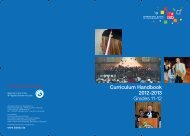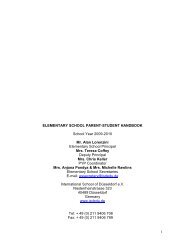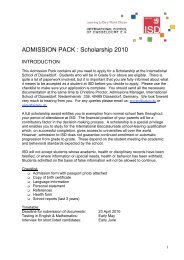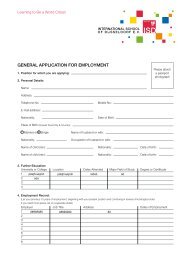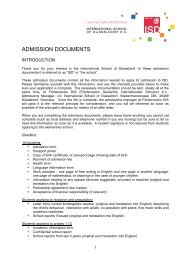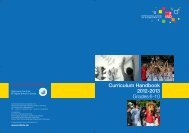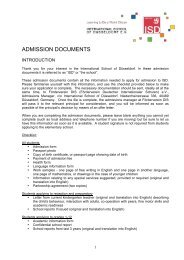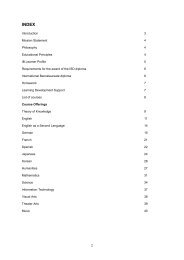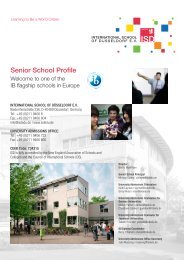SENIOR SCHOOL STUDENT - PARENT HANDBOOK
SENIOR SCHOOL STUDENT - PARENT HANDBOOK
SENIOR SCHOOL STUDENT - PARENT HANDBOOK
Create successful ePaper yourself
Turn your PDF publications into a flip-book with our unique Google optimized e-Paper software.
REGULATIONS<br />
1. DISCIPLINE CODE<br />
“At the International School of Düsseldorf, each member of the community<br />
has the right to safety, self-respect, courteous treatment and an atmosphere<br />
conducive to learning. When the behavior of any student infringes these<br />
rights of others or disrupts the educational process, the school shall apply<br />
some form of discipline to stop the offending behavior, to restore a positive<br />
and orderly atmosphere in the school, and to help the student develop an<br />
understanding of his responsibilities within the school community, as well as a<br />
willingness to fulfill them.” (policy 7.400)<br />
The school has a duty not only to educate the students in its care, but also to<br />
create and maintain the conditions in which education can take place. The<br />
ISD code of discipline, based on common sense and clearly defined<br />
expectations, plays a crucial part in establishing an environment in which<br />
effective teaching and learning can take place.<br />
Behavior should be based on respect for others and their property, and<br />
should reflect a spirit of constructive cooperation. At no time should any<br />
member of the school community display or condone behavior which will<br />
bring discredit on the individual or the school<br />
The school considers that its responsibilities for students, and the students’<br />
responsibilities to the code of discipline, extend to all official school activities,<br />
whether academic or extra-curricular, held on or off campus at any time.<br />
Infractions<br />
Occasionally, individuals are unable to maintain the standards required of<br />
them, and disciplinary procedures must be invoked; illustrative examples of<br />
types of infractions and their consequences are listed below.<br />
Minor infractions disturb the normal functioning of school, and include,<br />
disrupting classes, leaving campus without permission, disrespectful or<br />
insensitive language or behavior, or inappropriate displays of affection.<br />
These are dealt with by the teacher most directly involved or year head<br />
and might result in a warning or the loss of a point.<br />
Moderate infractions are deemed more harmful to the well-being of the<br />
community and could include repeated or more serious instances of minor<br />
infractions. The year head and principal deal these with, but members of<br />
the Judicial Board may also be consulted. Consequences include one or<br />
more from: a period of probation, loss of points, a letter home, or a<br />
parent conference.<br />
35



